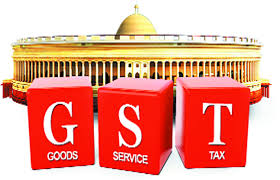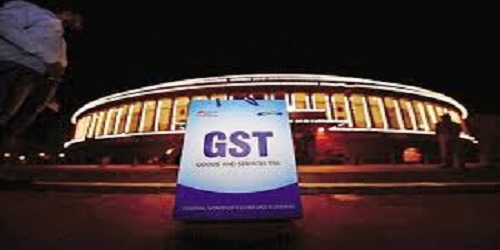Goods and Services Tax (GST) implementation in India is being considered is considered as biggest tax reform since independence in 1947.
Goods and Services Tax (GST) Overview:
The GST is a destination-based, single indirect tax that will be levied on consumption of goods or use of services across India.
- GST will be rolled out in India from July 1, 2017.
- It will replace 16 current levies (7 central taxes and 9 state taxes), consequentially creating India as one market with one tax rate.
- Goods and Services Tax (GST) Council headed by Union Finance Minister Arun Jaitley and comprising representatives of all states has finalised four tax brackets under GST viz. 5%, 12%, 18% and 28%.
FM Chairs 17th meeting of GST Council in New Delhi (Govt sets tax rate on state-run lottery at 12% and govt-authorised pvt lottery at 28%)
On June 18, 2017, Finance Minister Arun Jaitley chaired the 17th meeting of the GST Council in New Delhi to finalise tax rates on lottery as well as rules relating to e-way bill and anti-profiteering measures. 
- GST Council set tax rate on state-run lottery at 12% and government-authorised private lottery at 28%.
- During this meeting, it was also decided that GST rate of 28% will be applicable forhotel rooms above Rs. 7500. The rate will be 18% for rooms priced between Rs. 2500 to Rs. 7500.
GST council relaxes return filing timelines, says Arun Jaitley
GST Council has laid out a relaxed timetable and exemption from penalties and late fees to industry while filing GST returns in the first two months.
- According to the relaxed timetable for filing returns, the assessees could file their detailed invoice-based returns by September 5 for July. Before the relaxation was granted, the same was to be done by August 10.
- Similarly, for August, these returns could be filed by September 20, a relaxation of 10 days.
- However, the businesses will have to file GSTR 3B by August 20 in the case of July transactions, and by September 20 in the case of August transactions. These would be based on their own assessments of theirtax liability and input credit.
Govt notifies 18 sections, 2 rules for GST
On June 20, 2017, the government notified 18 sections relating to registration of current central excise, service tax and VAT payers with the GST-Network (GSTN). Besides, the Central Board of Excise and Customs (CBEC) has also notified two rules — registration and composition levy.
Key Provisions:
- Every business carrying out a taxable supply of goods or services with turnover exceeding the threshold limit of Rs 20 lakh will be required to register.
- The Sections in the Central GST (CGST) Act notified provide for all suppliers, anyone making any inter-state taxable supply and every existing licence holder and business entity, to register for GST.
- Input service distributor, e-commerce operator and person supplying online information and data base access or retrieval service are also required to register.
- The provision exempts agriculturist from registration to the extent of supply of produce out of cultivation of land.
- It also exempts any person engaged exclusively in the business of supplying goods or services or both that are not liable to tax or wholly exempt from tax.
- The notified sections provide that a person who occasionally supplies goods and/or services in a territory where GST is applicable but he does not have a fixed place of business, would be treated as a casual taxable person.
- A person with multiple business verticals in a state may obtain a separate registration for each business vertical.
All these notifications have been effective from June 22, 2017.
All States/UTs except the State of Jammu & Kashmir, approves the State GST Act and are ready for the smooth roll-out of GST with effect from 1st July, 2017.
As on June 21, 2017, all the States and Union Territories (having assemblies), except the State of Jammu & Kashmir have approved the State Goods and Services Tax (SGST) Act.
- The last one to join the list was Kerala, which passed the ordnance on June 21, 2017.
- Thus, almost all States/UTs are now ready for the smooth roll-out of GST with effect from July 1, 2017.
MeitY launches Web Portal for smooth GST implementation
With an objective to facilitate smooth migration of taxpayers related to Information Technology Services and Electronics goods to the new GST regime from July 1, 2017, Ministry of Electronics and Information Technology has launched a dedicated webpage.
- The webpage can be accessed through Ministry’s Web Portal meity.gov.in.
- Individuals, Companies and Entrepreneurs in IT and Electronics sector can visit the webpage for sector-specific information.
- It also enables filing of grievances in relation to implementation of GST.




